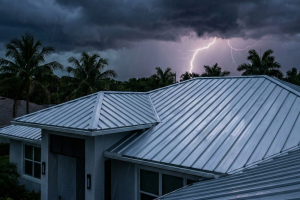
Do Metal Roofs Attract Lightning?
One of the most persistent misconceptions is that metal roofs attract lightning. However, scientific research shows that this is not true. Lightning does not “choose” where to strike based on materials but rather on the height and prominence of a structure. Metal roofs are not magnets for lightning and do not increase the likelihood of a strike. What determines a lightning strike is the height, shape, and isolation of the building, rather than the type of roofing material.
The misconception likely stems from the fact that metal conducts electricity. However, just because metal is conductive doesn’t mean it attracts lightning. In fact, metal roofing can actually help disperse the energy from a lightning strike, which we’ll explore further in the following sections.
Does Aluminum Attract Lightning?
This brings us to another common question: does aluminum attract lightning? Like other metals, aluminum does not inherently attract lightning. Whether your roof is made of aluminum, steel, or copper, none of these metals are more likely to cause a lightning strike. Aluminum is often used in roofing because it’s lightweight and corrosion-resistant, making it an excellent material for long-term durability. The fact that it conducts electricity doesn’t mean it’s more likely to be struck.
In regions like Florida, where lightning storms are frequent, using aluminum roofing can actually enhance the safety of a home, as it channels electrical energy safely away from the structure when grounded properly.
Are Metal Roofs Safer During a Lightning Strike?
A key concern for homeowners is whether metal roofs are safer during a lightning strike compared to other materials like asphalt shingles or tiles. Surprisingly, metal roofs offer significant safety advantages in the event of a lightning strike. Here’s why:
- First, metal is a non-combustible material, meaning it won’t catch fire when struck by lightning. Other materials, like wood or asphalt shingles, could potentially ignite during a lightning strike, posing a greater risk to the home.
- Second, while metal roof lightning safety is enhanced by the conductive properties of the material, this conductivity helps disperse the electrical charge over a larger surface. Rather than concentrating in one spot and causing severe damage, the energy is spread out, reducing the likelihood of harm to the home. Metal roofs act as a Faraday cage of sorts, safely guiding the electricity away.
The Role of Proper Grounding for Metal Roofs
While does metal attract lightning remains a frequently asked question, it’s essential to consider the role of proper grounding. Grounding is the process of channeling the electrical energy from a lightning strike safely into the ground, preventing it from entering the home’s electrical system.
For those worried about lightning on metal roofs, ensuring the roof is properly grounded provides an additional layer of protection. Many homes with metal roofs are also equipped with lightning rods, which are designed to attract lightning away from the roof itself and channel the energy safely into the ground.
Common Myths About Metal Roofs and Lightning
Let’s dispel some common myths surrounding metal roof lightning safety:
- Myth 1: Metal roofs increase the chance of a lightning strike. This is false. Metal does not “attract” lightning any more than other materials.
- Myth 2: Metal roofs are dangerous during a storm. In fact, metal roofs are one of the safest materials you can have during a lightning storm due to their fire-resistant properties.
- Myth 3: Lightning will melt or destroy the metal roof. Metal roofs are designed to withstand extreme weather conditions, including lightning. While other materials might burn or break, metal remains largely unaffected.
How Metal Roofs Offer Long-Term Safety
When it comes to long-term safety, metal roofs do not attract lightning, but they do offer robust protection in the rare event of a strike. Metal roofs are durable and designed to last up to 50 years or more, making them a long-term investment for your home. The ability of a metal roof to withstand wind, rain, hail, and lightning means fewer repairs and a safer home overall.
Moreover, metal roofs are also environmentally friendly. Many metal roofing materials are made from recycled metals, and they can also be recycled at the end of their lifespan, making them a sustainable choice for eco-conscious homeowners.
Should You Choose a Metal Roof in a Lightning-Prone Area?
For those living in areas with frequent storms, such as Florida, a metal roof can be one of the best roofing options available. Beyond safety, metal roofs provide excellent protection against other elements such as high winds, rain, and debris. Roofing in Florida requires durable materials that can withstand harsh weather conditions, and metal provides just that.
If you’re still wondering, “is lightning on metal roofs dangerous?”, rest assured that with proper installation and grounding, metal roofs are one of the safest roofing materials available.
Contact Us (954-426-8050) For a Free Roof Evaluation
—
 About Monarch Roofing & Construction
About Monarch Roofing & Construction
Monarch Roofing and Construction proudly serves residential and commercial clients in South Florida with roofing, renovation, and new construction projects. Since 2005, our roofing services have been used all around Florida to meet the needs of homeowners and property managers, extending from Palm Coast to Miami. With our commitment to personalized service and high-quality craftsmanship, Monarch Roofing has established itself as a trusted industry leader dedicated to customer satisfaction. Our extensive service offerings include installation and repair of all types of roofs. As Florida State Certified Roofing and General Contractors, Monarch brings expertise to both residential and commercial projects, emphasizing professionalism, transparency, and cutting-edge technology in their approach. We specialize in hurricane preparedness and participate in the My Safe Florida Home Program, helping homeowners protect their properties from severe weather with expert inspections and recommendations.
> Learn More

 About Monarch Roofing & Construction
About Monarch Roofing & Construction